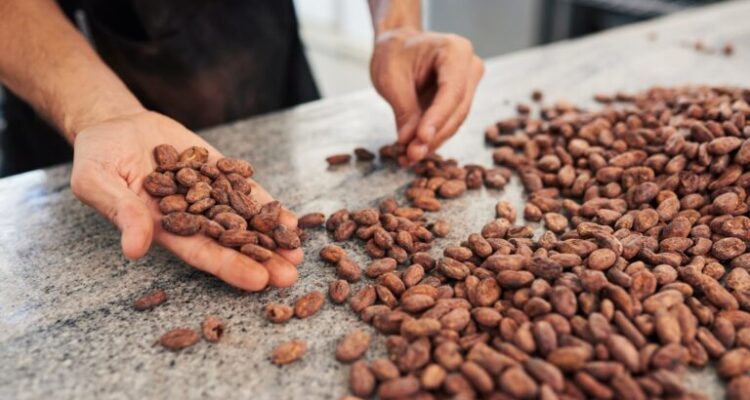Israel has the wrong climate for growing cocoa but a new startup aims to grow it sustainably and ethically in a lab – and it’s already sparking interest with snack makers.
By Elana Shap, ISRAEL21c
Why would one of the world’s largest snack companies, whose brands include Cadbury, Toblerone, Oreo and Milka, bank on a supply of cocoa from Israel?
The cocoa bean, from which the key ingredient in chocolate is derived, has never been cultivated in Israel. It’s not difficult to understand why. Cocoa plantations need humid tropical weather, as found in Ghana, Ivory Coast and Ecuador, the top three producers in this $130 billion industry.
These climatic conditions are of no concern for one Israeli agrifood startup aiming to produce “the food of the gods.” Celleste Bio’s high quality cocoa will be produced in a laboratory.
The company, situated in the Misgav Industrial Park in northern Israel, aims to do this using conventional cell culture methods.
Chief Technology Officer Hanne Volpin explains to ISRAEL21c how it’s done:
“You can, in principle, grow plant cells almost as easily as growing yeast. Put them in a solution of sugar, water and vitamins and they will keep multiplying and growing. The trick is for the end result to be the product you want, in this case cocoa butter and powder,” she says.
“Now we are at the stage of trying to find what the optimal growth conditions are for the stem-cell-like plant.”
The next step will be to visit the World Cocoa Gene Bank in Trinidad and Tobago to collect cocoa varieties.
And Volpin is insistent there will be no genetic modifications thereafter, “no lab tricks to change natural variations.”
Underage labor, unsustainability
Celleste Bio was founded a year and a half ago by Volpin and fellow cellular biology experts and agri-food sector entrepreneurs Avishai Levy, Orna Harel and Daphna Michaeli.
“Besides loving chocolate,” says Volpin with a laugh, “we all realized the problems in the cultivation of cocoa and the challenges the industry was facing.”
In the past few decades organizations and journalists brought the chocolate industry under scrutiny for unethical farming and labor practices. A documentary, “The Dark Side of Chocolate” (2010), exposed illegal child labor and slavery on cocoa farms in Western Africa.
In an effort to reform the industry, a Fair Trade seal is now put on all chocolate products made from ethically farmed cocoa.
This allows consumers to know the farmers were paid a living wage (often above market value, which is very low) and that the workers were of a legal age and had safe working conditions.
Despite these advances, the prevalence of underage labor (around 1.56 million children) in cocoa-producing areas in Ivory Coast and Ghana has not substantially decreased over the last 10 years, according to a 2021 European Commission report.
Another problem plaguing the industry is unsustainable farming methods. In the Ivory Coast it is estimated that 70 percent of the country’s illegal deforestation is related to cocoa farming. Climate changes such as droughts or floods have also led to plant diseases and loss of harvests, making the supply chain unstable.
As Volpin tells ISRAEL21c: “There is no silver bullet where you find solutions to not tearing down the rainforest, not having child labor and making sure the farmer has a reasonable income. What we are offering is a technology that ensures that the cocoa yield supply is invariable, is not dependent on climate conditions and that the final product is of a superior quality.”
Taking farming to a new level
This makes clear why Mondelēz International — the third largest producer of snacks in the world, employing 89,000 people — would view lab-grown cocoa as an attractive solution.
Other seed investors in Celleste Bio include Israel-based The Trendlines Group, US-based Barrel Ventures and the Regba Group Israeli agricultural cooperative.
Trendlines, which is traded on the Singapore Stock Exchange, invests in agrifood startups and provides an incubator for them.
As CEO of Trendlines Agrifood Fund, Nitza Kardish, tells ISRAEL21c: “We are looking to solve big issues of the food chain and one of the biggest is raw materials that are produced in a sustainable way. We believe Celleste Bio takes farming to another level and can really make a change in the way cocoa is produced. It will impact the entire chocolate industry.”
Once the Celleste laboratory has built up a biomass of 1,000 liters, it will be transferred to a production facility.
The question will then be, says Volpin, whether small amounts of cocoa should be grown close to manufacturing facilities and lower the carbon footprint caused by transportation, or in spaces such as the Negev Desert where solar power could be used – and, she adds, “will make Israel a cocoa superpower.”
A different mindset
Danish-born, Volpin has a PhD from the Hebrew University’s Faculty of Agriculture, and is enthusiastic about the local agro sector.
“Israel is very exciting. We are good at problem solving and we don’t have a population of old seasoned farmers who have decided you can only farm one way,” she says.
“We have a lot of highly educated curious farmers who like to be on the forefront of using different technologies. They are always ready to implement and try.”
She does understand, however, those countries in which farmers have to take a far more conservative approach.
“You can’t play around with a family’s income. A tomato grower that hardly makes enough to have food at the end of the month can’t start experimenting. In Israel we are fortunate to have a different mindset.”





